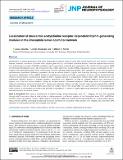Localization of muscarinic acetylcholine receptor dependent rhythm generating modules in the Drosophila larval locomotor network
Abstract
Mechanisms of rhythm generation have been extensively studied in motor systems that control locomotion over terrain in limbed animals; however, much less is known about rhythm generation in soft-bodied terrestrial animals. Here we explored how muscarinic acetylcholine receptor (mAChR) modulated rhythm generating networks are distributed in the central nervous system (CNS) of soft-bodied Drosophila larvae. We measured fictive motor patterns in isolated CNS preparations using a combination of Ca2+ imaging and electrophysiology while manipulating mAChR signalling pharmacologically. Bath application of the mAChR agonist oxotremorine potentiated bilaterally asymmetric activity in anterior thoracic regions and promoted bursting in posterior abdominal regions. Application of the mAChR antagonist scopolamine suppressed rhythm generation in these regions and blocked the effects of oxotremorine. Oxotremorine triggered fictive forward crawling in preparations without brain lobes. Oxotremorine also potentiated rhythmic activity in isolated posterior abdominal CNS segments as well as isolated anterior brain and thoracic regions, but it did not induce rhythmic activity in isolated anterior abdominal segments. Bath application of scopolamine to reduced preparations lowered baseline Ca2+ levels and abolished rhythmic activity. Overall, these results suggest that mAChR signalling plays a role in enabling rhythm generation at multiple sites in the larval CNS. This work furthers our understanding of motor control in soft-bodied locomotion and provides a foundation for study of rhythm generating networks in an emerging genetically tractable locomotor system.
Citation
Jonaitis , J , MacLeod , J & Pulver , S R 2022 , ' Localization of muscarinic acetylcholine receptor dependent rhythm generating modules in the Drosophila larval locomotor network ' , Journal of Neurophysiology , vol. 127 , no. 4 , pp. 1098-1116 . https://doi.org/10.1152/jn.00106.2021
Publication
Journal of Neurophysiology
Status
Peer reviewed
ISSN
0022-3077Type
Journal article
Description
This work was supported by the Wellcome Trust through an ISSF award (105621/Z/14/Z) to the University of St Andrews. It was also supported by a Biotechnology and Biological Sciences Research Council (BBSRC) project grant (BB/M021793) awarded to SRP, a CASE studentship awarded to J. M. (BB/M010996/1) and a donation from Kaunas Industrial Water Supply (Kauno Pramoninis Vandentiekis, Kaunas, Lithuania) in support of J. J.Collections
Items in the St Andrews Research Repository are protected by copyright, with all rights reserved, unless otherwise indicated.

